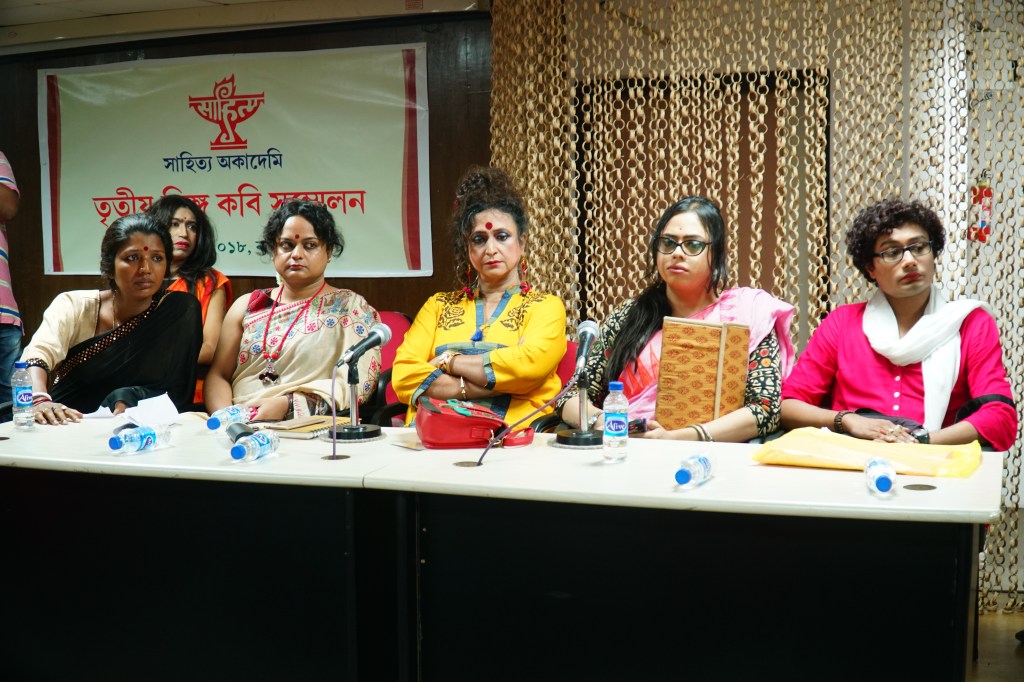Mainstream. The word holds little significance for a major chunk of the transgender community in India. But for a brief moment, their legitimacy was ‘mainstream’ when the trans community in Kolkata declared their plans to host the first ever trans poetry meet in the city, at the Sahitya Akademi, on July 17.
The brief one-and-a-half-hour programme reflected the community’s daily struggle to become mainstream, through poetry that was largely drawn from their real-life experiences. The antagonist, as it turns out, isn’t always society. The meeting also highlighted clashes and a lack of unity within the community itself. Ironically, the first ever such poetry meet, which could have been a historic moment for the third gender in the state as well in the country, was tainted with ugly spats that hinted at two strong lobbies within the community itself.
Videos by VICE

It was a unique mix of transgender poets, comprising a college professor, a math teacher, an award-winning actor, a nurse, an NGO-activist. Verses like Amar Anubhati (My Feelings) and Ekti Patar Mrity (Death of a leaf) by Prosphutita Sugandha, Saapmochan and Bichched Ebong (And Separation) by Debdatta Biswas, Chakravyuh (Cycle) by Aruna Nath, and Rup Antorer Pala (Turn to the heart) posed as glimpses into lives we are not usually privy to.
Dr Manabi Bandopadhyay is a well-known name, after being appointed as the first transgender principal at a district college. “Transgender literature is mostly drawn from real life experiences,” she said. “It would give you a slight hint of our daily misery. I wish more and more third gender people come up with their poetry and creations. It’s kind of an escape route you see.” Dr Bandopadhyay added a personal touch by inviting each poet to share their journey of coming out of the closet.
“My mother would sit near the idol, cry her heart out and say, ‘He is my son. I have given him birth. Oh Lord help us in this difficulty.’ And I would hide in the room all day long,” read out Prosphutita Sugandha.

To survive by means other than begging at traffic signals, public parks or dancing and singing at birth ceremonies, a number of transgender women often turn to prostitution. While physical needs and hungers are often satiated, Rani Majumder through her poem, spoke of others that are not. “Spending a summer afternoon with the 15-year-old Japanese boy… So much body, where’s the heart?”
Being dumped by a girlfriend for not being manly enough, excluded by the family, every day bullying at workplaces—the poetry fest allowed the community to scream their hearts out. “I am so impressed with the poetry, the stories and everything else about this event, I just hope we come up with more such events,” said Priti Raha, a student of Calcutta University, currently doing research on Bengal’s transgender literature.
Although it looked like a big fat success, it was marred by controversy. An ugly heated conversation cropped up between Ranjita Sinha, a former Member of the West Bengal Transgender Board, who had been protesting and questioning the authenticity of the fest on social media since the announcement of the fest.
“It’s very, very unfortunate. She had a lot to say against Manabi and the fest committee. It actually shows how we are fighting within the community, and instead of standing by each other, trying to pull each other down,” said a member of the community who did not wish to be named.
Sinha, however, maintained, “I have no personal grudge towards anyone. I raised my voice as there were some derogatory comments being made against the transgender NGOs.”

The argument was soon overshadowed as Dr Bandopadhyay invited Madhu, Shankari, Kalpana, Anjali from the hijra community on stage. “We are here to acknowledge transgender poets, but how many of us actually realised the talent of these hijras who write and compose their own songs?” she asked, as they launched into song and dance, effortlessly engaging the whole hall.
“Who would have thought that civilised society would sit and watch us doing our hijra dance? I can definitely not forget this day,” said Shankari.




